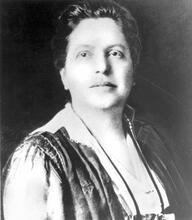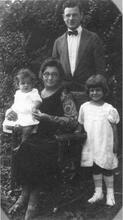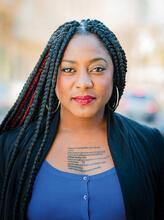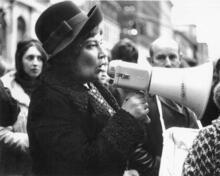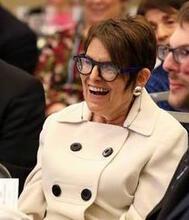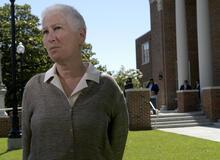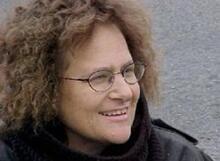Judith Heumann
Judith (“Judy”) E. Heumann, a founder of the disability rights movement, is known worldwide as a leader of the disability rights community. She was instrumental in the development in disability rights legislation, such as the Americans with Disabilities Act (ADA), the Individuals with Education Act, and the UN Convention on the Rights of Persons with Disabilities. In 1977, she led a 26-day takeover of a San Francisco federal building. The protest led to implementation of federal legislation (Section 504 of the Rehabilitation Act of 1973), a precursor of the Americans with Disabilities Act. Heumann is the author with Kristen Joiner of Being Heumann: An Unrepentant Memoir of a Disability Rights Activist. She is featured in the award-winning Netflix documentary Crip Camp.
Early Life and Education
Judith Heumann was born in Philadelphia, Pennsylvania, on December 18, 1947. Her parents had both left Germany and come to the United States in their teens, as Hitler was coming into power. Heumann’s father, Werner, was sent by himself at age fourteen to live with an uncle in Brooklyn; his three brothers jointed him later. Heumann’s maternal grandparents sent her mother, Ilse, age twelve and an only child, by herself to Chicago, where she lived with a relative she had never met. Both became orphans because of the Holocaust.
Judy and her brothers Joey and Ricky grew up in Brooklyn. When she was eighteen months old, Heumann contracted polio. She was in an iron lung for three months and in and out of the hospital for three years. As a result of the polio, Heumann became a quadriplegic and used a wheelchair for mobility. She never wished that she did not have a disability (Being Heumann xi).
When she was 36, Heumann learned from her father that when she was two, one of her doctors had suggested institutionalizing her (Ted Talk Fall 2016). At the time, institutionalization was the norm; disabled children were considered to be a hardship, and disability was stigmatized (Being Heumann xi). Heumann’s parents rejected this suggestion. The Nazis, believing that people with disabilities were “life unworthy of life,” had put disabled children in institutions and killed 5000 through starvation or lethal injection. Knowing how the Nazis had dehumanized and murdered disabled children, her parents would never have agreed to institutionalize her, Heumann believed (Being Heumann xiii).
When Heumann was five, her mother took her to register for kindergarten, but the principal refused to allow her to attend school. “Judy is a fire hazard,” he said (Being Heumann 8). As a result, Heumann did not attend school until she was nine. Until then, she received two-and-a-half hours of home instruction a week. A teacher was sent to the Heumann home once a week for an hour and once for an hour and a half, and her parents were given no materials to supplement her instruction. “The idea that I could learn anything meaningful in two and a half hours of instruction a week was, of course, ludicrous,” Heumann wrote in her memoir, “although Mrs. Campfield was a nice woman and I did like having someone other than my mother teaching me” (Being Heumann 9).
Heumann then attended special education classes from fourth through eighth grade in public school (P.S. 219) through New York City’s Health Conservation 21 special education program; the special education classes were held in the basement, while “regular” students were educated on the upper floors. When her parents learned that there were no disability-accessible high schools, they banded together with other parents and successfully demanded that the New York City Board of Education make some high school accessible (Ted Talk Fall 2016). When she was in high school, the nondisabled students didn’t see Heumann as a “normal girl” – someone with whom they would hang out or date (Being Heumann 31).
The summer after she entered the Health Conservation Program 21 at age nine, Heumann went to a summer camp for disabled children. It was the beginning of her “ten-year love affair with camp.” At camp, the children with disabilities “tasted freedom” for the first time. They partied, played rock music, and “snuck off to make out in the dark” (Being Heumann 24).
Heumann graduated from Long Island University with a BA in 1969, majoring in speech and theater and minoring in education. She received an MA in public health from the University of California at Berkeley in 1975.
Fight to Become a Teacher
Heumann had always wanted to be a teacher. She had taken the appropriate courses in college, minoring in education, and passed the oral and written exams. Yet, the New York City Board of Education denied her application for a teaching license because she could not walk—“paralysis of both lower extremities, sequela of poliomyelitis” was the reason given for not hiring her (Being Heumann 51).
Heumann felt that the Board of Education had discriminated against her because of her disability. A disabled friend who was a stringer for The New York Times persuaded a Times reporter to write an article about Heumann’s situation. The article, “Woman in Wheelchair Sues to Become Teacher,” generated support for her.
Represented by Roy Lucas of the James Madison Constitutional Law Center, Heumann sued the Board of Education in federal court, charging that she had been discriminated against because of her disability. The judge in the case was the first Black federal female judge, Constance Baker Motley, and she knew discrimination when she saw it (Ted Talk 2016). The Board of Education, when it became clear it would lose, settled out of court and granted Heumann her teaching license.
Heumann was a teacher for three years. She taught at P.S. 219, the school where she had been a student. It was the first time both the disabled and nondisabled students at P.S. 219 had had a teacher with a disability.
In the aftermath of her case, Heumann and her friends founded Disabled in Action, a disability organization “run by and for disabled people.”
Section 504
In 1973, Congress passed and President Richard Nixon signed the Rehabilitation Act of 1973. Section 504 of this legislation prohibited discrimination against any “otherwise qualified handicapped individual in the United States” by any program receiving Federal funds. Section 504 would provide civil rights protections for disabled people in much of American life—from some forms of employment to housing to transportation to education, Heumann believed (Being Heumann 67). But regulations needed to be written and signed before Section 504 could be implemented.
Four years later, in 1977, the regulations to implement Section 504 had still not been signed. The U. S. Department of Health, Education and Welfare (HEW) was the lead federal agency on Section 504 implementation. On April 5, 1977, disabled people staged protests in HEW regional offices and at HEW headquarters in Washington, D.C.
Heumann was a leader of the 26-day 504 Sit-In by more than 100 protesters at the San Francisco HEW office. The take-over is believed to be the longest non-violent sit-in at a federal building (New York Times March 26, 2021). Heumann and a contingent of demonstrators confronted HEW Secretary Joseph A. Califano, Jr. On April 28, 1977, in Washington, D.C., Califano signed the regulations implementing Section 504.
Reflecting on the struggle to implement Section 504, Heumann recalled growing pride among the disability community at the time: “we needed to speak out loudly and proudly” (Interview with author). This pride would only increase among the generation born after the Americans with Disabilities Act was passed in 1990; ADA generation has high expectations and “disability pride,” Heumann believed (interview with author, March 10, 2021).
Career
Heumann made a career in the field of disability rights. She moved to Berkeley, California, in 1973 and was one of the founders of the Berkeley Center for Independent Living, the first such grassroots independent living center in the United States. The Center helped to launch the independent living movement nationally and globally, and Heumann’s efforts helped expand the Center’s work to include people who had their disabilities as younger children.
In 1983, Heumann co-founded the World Institute on Disability (WID), with Ed Roberts and Joan Leon. WID, one of the first global disability rights organizations, works to integrate disabled people into their communities. While she was with WID, the disability community began working toward passage of the Americans with Disabilities Act (ADA). Heumann attended meetings, testified at hearings, and lobbied to fight for the ADA’s passage (Being Heumann 162). President George W. Bush signed the ADA into law on August 26, 1990. “Our time had come,” Heumann later wrote. “After nearly twenty years of protesting…, we had created what I believe to be the strongest, most comprehensive civil rights legislation for disability in the world” (Being Heumann 171).
Heumann also served in the Clinton Administration as the Assistant Secretary for the Office of Special Education and Rehabilitative Services in the United States Department of Education, from 1993 to 2001. From 2002 to 2006, she was the World Bank’s first Advisor on Disability and Development. While in this position, she helped to develop the UN Convention on the Rights of Persons with Disabilities (CRPD). While serving as the first Special Advisor for International Disability Rights at the U.S. Department of State, from 2010 to 2017, she led the effort to mobilize support in the Senate for the CRPD, but unfortunately the CRPD was never ratified.
In 2007, Washington, D.C., Mayor Adrian Fenty appointed Heumann as the first Director for the Department on Disability Services; she served in this position until 2010. She was responsible for the Developmental Disability Administration and the Rehabilitation Services Administration.
From 2017 to 2019, Heumann was a Senior Fellow at the Ford Foundation. There, with Katherine Salinas and Michellie Hess, she wrote a white paper called Road Map for Inclusion: Changing the Face of Disability in Media. “Diversity is in the zeitgeist and disability is being left out of the conversation,” Heumann wrote. “One in four Americans is disabled, and they should be represented proportionally in front of and behind the camera” (Road Map for Inclusion executive summary).
Heumann also served on a number of non-profit boards, including the American Association of People with Disabilities, the Disability Rights Education and Defense Fund, Humanity and Inclusion, and Human Rights Watch.
Personal Life and Recognition
Heumann met her husband, Jorge Pineda, an accountant (now retired), in 1991. They married in a civil ceremony on May 30, 1992, followed by a religious ceremony on August 15, 1992. They had no children but were very close to their nieces and nephews and great nieces and nephews.
Heumann received numerous awards. She was the first recipient of the Henry B. Betts Award and was awarded the Lifetime Achievement Award from the National Council on Independent Living. She has received numerous honorary doctorates.
Heumann was also featured in numerous documentaries, including Crip Camp: A Disability Revolution, Lives Worth Living, and her story was portrayed by actress Ali Stroker on Comedy Central’s Drunk History.
Heumann delivered the Fall 2016 Ted Talk Our Fight for Disability Rights and Why We’re Not Done Yet.
Jewish Identity
Jewish identity was important to Heumann throughout her life. “I am a practicing Jew,” Heumann said in an interview (Interview with author).
As children, Heumann and her brother Joey attended Hebrew school, and her father carried her up the stairs to the women’s section of the synagogue the family attended.
When Judy was denied entrance to public school, her mother approached a yeshiva; the principal responded that she could attend if she learned enough Hebrew. Determined, Heumann’s mother asked Judy’s physical therapist’s wife, who was Israeli, to teach her Hebrew. The principal denied her entrance anyway.
Later, in the 1980s, Heumann traveled with her brother and some friends to Germany, where none of the family had been since her parents left as children. An old friend of Heumann’s father took them to Hoffenheim, where her father had grown up. While the people were kind, the “remarkable” thing was, Heumann later recalled, that “not one word was said about what happened to the Jews” (Being Heumann 156). The silence persisted even when they were shown the site where the synagogue had been burned down. “I refused to give in to the pressure of the silence,” Heumann wrote (Being Heumann 156).
When Heumann lived in Berkeley, the Lit. "elevated place." Platform in the synagogue on which the Torah reading takes place.bimah of the synagogue she attended was made disability accessible for her. When the rabbi asked if she would like an Lit. "ascent." A "calling up" to the Torah during its reading in the synagogue.aliyah, she was stunned, having grown up in a synagogue that did not permit women to approach the bimah or receive an aliyah. “Oh, my god, I thought, I’ve never been asked to do an Aliyah,” she later wrote (Being Heumann, 161).
Reflections on Disability Rights
Heumann believed that the disability community had made great strides in fighting for its rights but society still had a long way to go. People still fear disability, she believed. Many disabled people still do not want to disclose their disability, and many nondisabled people avoid getting close to disabled people. Disabled women are making themselves more known in the women’s movement, which is becoming more inclusive. But it’s not “yet a natural thing across the board,” Heumann said (interview with author).
Heumann wanted to be remembered as an outspoken person who speaks her mind (interview with author). She wanted people to remember her as a change agent, a fighter, and a collaborator—as setting a big table where all are welcome and invited.
Judy Heumann died on March 4, 2023.
Selected Works by Judith Heumann
with Kristen Joiner. Being Heumann: an Unrepentant Memoir of a Disability Rights Activist, Boston: Beacon Press, 2020.
with Katherine Salinas and Michellie Hess. Ford Foundation White Paper: Changing the Face of Disability in Media, 2017-2019
Our Fight for Disability Rights – and Why We’re Not Done Yet, TEDxMidAtlantic, October 2016.
Carmel, Julia. “Before the A.D.A., There Was Section 504." The New York Times, July 22, 2020.
Crip Camp, directed by James Lebrecht and Nicole Newnham. Netflix, 2020.
Heumann, Judith. Interview with the author, March 10, 2021.
Hicks, Nancy. “Califano Signs Regulations to Ban Discrimination Against Disabled.” The New York Times, April 29, 1977.
Malcolm, Andrew H. “Woman in Wheel Chair Sues to Become Teacher.” The New York Times, May 27, 1970.
“Polio Victim Wins Teacher’s License.” The New York Times, June 20, 1970.
Shapiro, Joseph P. No Pity: People With Disabilities Forging a New Civil Rights Movement. New York: Three Rivers Press, 1993.
Wu, Wendy. “Overlooked No More: Kitty Cone, Trailblazer of the Disability Rights Movement. New York Times, March 26, 2021.


